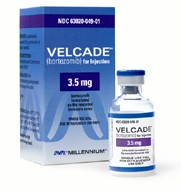Does quercetin synergize the chemotherapy drug velcade (bortezomib) in the treatment of multiple myeloma? While your average oncologist may say no, studies say yes.
I am holding out the anti-supplement attitude of oncology based on the anecdotal feedback from hundreds of myeloma patients over the years. I am a myeloma survivor myself and have spent years talking with MM patients online. Most oncologists advise against concepts such as integrative therapies like queretin and velcade.

In all fairness, I can’t fault oncology. If you read the second study linked below, you might get the idea that quercetin does not synergize velcade. The second study linked below is from 2008. The top meta analysis is from 2022.
When it comes to non-conventional therapies such as quercetin, oncology generally parrots what they’ve been told. The party line is usually “supplementation interferes with chemo.” Don’t!
To complicate this discussion even more, I want to introduce the term “multi drug resistance” or MDR. In short, almost all myeloma patients develop MDR eventually. Myeloma eventually stops responding to chemotherapy.
The reason why I’m highlighting quercetin’s ability to integrate with velcade is because it will eventually stop controlling the myeloma patients plasma cells. All myeloma patients relapse again and again until they run out of therapy options.
What is multi drug resistence (MDR) in multiple myeloma treatment?
Multidrug resistance (MDR) in the context of multiple myeloma refers to the ability of cancer cells to resist the effects of multiple drugs that are commonly used in the treatment of this type of cancer. Multiple myeloma is a cancer of plasma cells, which are a type of white blood cell that produces antibodies. Treatment typically involves chemotherapy, which uses drugs to kill or slow down the growth of cancer cells.
However, over time, some cancer cells may develop mechanisms to resist the effects of these drugs. This resistance can make the treatment less effective, and it is a significant challenge in the management of multiple myeloma and other cancers.
Several mechanisms can contribute to multidrug resistance in cancer cells, including:
- Increased drug efflux: Cancer cells may pump out drugs before they have a chance to exert their effects. This is often mediated by proteins called ATP-binding cassette (ABC) transporters, such as P-glycoprotein.
- Alterations in drug metabolism: Cancer cells may modify the drugs, rendering them inactive or less effective. This can occur through changes in drug-metabolizing enzymes.
- DNA repair mechanisms: Cancer cells may enhance their ability to repair DNA damage caused by chemotherapy, reducing the effectiveness of these treatments.
- Anti-apoptotic mechanisms: Cancer cells may evade programmed cell death (apoptosis), which is induced by many chemotherapy drugs, allowing them to survive and continue to proliferate.
As you can see from the posts linked below, integrative therapies are common among many different cancers. Velcade quercetin synergy is only one of many integrative therapy combinations.
Are you a myeloma survivor? Are you trying to think outside the conventional, standard-of-care therapy box? Let me know- David.PeopleBeatingCancer@gmail.com
Hang in there,
David Emerson
- MM Survivor
- MM Cancer Coach
- Director PeopleBeatingCancer
“Multiple myeloma (MM) is a clonal plasma cell tumor originating from a post-mitotic lymphoid B-cell lineage. Bortezomib(BTZ), a first-generation protease inhibitor, has increased overall survival, progression-free survival, and remission rates in patients with MM since its clinical approval in 2003. However, the use of BTZ is challenged by the malignant features of MM and drug resistance…
Polyphenols, classified into flavonoid and non-flavonoid polyphenols, have potential health-promoting activities, including anti-cancer. Previous preclinical studies have demonstrated the anti-MM potential of some dietary polyphenols…
Therefore, these dietary polyphenols have the potential to be alternative therapies in anti-MM treatment regimens…
This systematic review examines the synergistic effects of flavonoids and non-flavonoid polyphenols on the anti-MM impacts of BTZ.
Preclinical studies on flavonoids and non-flavonoid polyphenols-BTZ synergism in MM were collected from
- PubMed,
- Web of Science, and
- Embase
published between 2008 and 2020.
19 valid preclinical studies (Published from 2008 to 2020) were included in this systematic review. These studies demonstrated that eight flavonoids (icariin, icariside II, (-)-epigallocatechin-3-gallate, scutellarein, wogonin, morin, formononetin, daidzin), one plant extract rich in flavonoids (Punica granatum juice) and four non-flavonoid polyphenols (silibinin, resveratrol, curcumin, caffeic acid) synergistically enhanced the anti-MM effect of BTZ.
These synergistic effects are mediated through the regulation of cellular signaling pathways associated with proliferation, apoptosis, and drug resistance. Given the above, flavonoids and non-flavonoid polyphenols can benefit MM patients by overcoming the challenges faced in BTZ treatment…
Conclusions and Future Directions
Although treatment options for MM continue to be optimized, the prognosis remains unsatisfactory. The aggressiveness and drug resistance of malignant tumors hinder the current treatment with protease inhibitors—especially BTZ…
Flavonoids(icariin, icariside II, EGCG, scutellarein, wogonin, morin, formononetin, daidzin), plant extract rich in flavonoids(PGJ), and non-flavonoid polyphenols(silibinin, resveratrol, curcumin, caffeic acid) combined with BTZ demonstrate the synergistic anti-MM effect.
These synergistic anti-MM effects were achieved by anti-proliferative, pro-apoptotic, and anti-drug resistance. Based on those pieces of evidence, flavonoids, plant extract rich in flavonoids, and non-flavonoid polyphenols may benefit patients with MM, especially by overcoming the challenges faced in BTZ therapy…”
“Dietary flavonoids have many health-promoting actions, including anticancer activity via proteasome inhibition. Bor-tezomib is a dipeptide boronate proteasome inhibitor that has activity in the treatment of multiple myeloma..
Dietary flavonoids, quercetin and myricetin, which are abundant in plasma, inhibited bortezomib-induced apoptosis of primary CLL and malignant B-cell lines in a dose-dependent manner… The addition of boric acid diminished the inhibitory effect of both quercetin and plasma on bortezomib-induced apoptosis. The protective effect was also reduced when myeloma cell lines, but not B-cell lines, were preincubated with quercetin, indicating a direct effect of quercetin on myeloma cells…
However, in myeloma cell lines, quercetin also had an additional direct effect on the cells to increase their sensitivity to bortezomib. Overall, dietary flavonoids show competing interactions with tumor cells and bortezomib, which are dose- and tumor type–dependent…
Quercetin also had the same inhibitory effect on bortezomib-induced apoptosis in 2 myeloma cell lines, U266 and RPMI-8226 (B). However, the myeloma cell lines required higher levels of quercetin (40 μM) for maximal inhibition of bortezomib-induced apoptosis, compared with 20 μM for primary CLL, HRC57, and DoHH2 cells. In addition, myeloma cell lines were more susceptible to quercetin-mediated G2/M arrest compared with the B-lymphoma cell lines (data not shown)…




